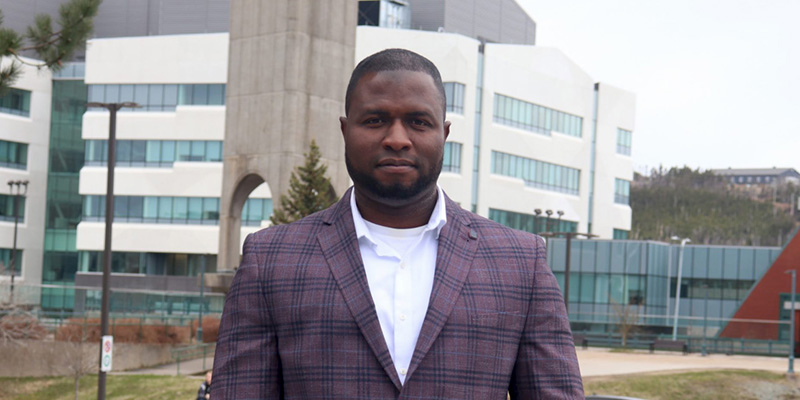Unique lens

For Dr. Festus Ajayi, the path to a PhD in business was a natural extension of his lifelong passion for teaching, as well as a growing fascination with the complexity of the world of business and its relevance to everyday life.
Now a proud graduate of the Faculty of Business Administration’s PhD in Management Program, Dr. Ajayi is reflecting on the experiences, challenges and transformative lessons that defined his doctoral journey.
He says he’s always seen myself in academia: researching, teaching, contributing to knowledge.
“My very first job out of high school was as a teacher, and I still remember how rewarding it felt to help the students understand new topics,” he said. “That sense of fulfillment stuck with me.”
While his interest in business developed during his undergraduate years, it wasn’t until he pursued graduate studies in the U.K. that his vision came into focus.
A PhD felt like a natural next step for me, as was his academic institution of choice: Memorial University.
“When I began looking at PhD programs, Memorial University stood out, mainly because of its academic environment, research culture and my feel for Newfoundland. It just felt like the right place for me.”
Meaningful contributions
Dr. Ajayi’s dissertation focused on an emerging area in organizational behaviour: how leaders experience incivility from members of their teams.
“Most research focuses on mistreatment by leaders or among peers. I was fascinated by the reverse dynamic.” — Dr. Festus Ajayi
He says leaders are “critical” to shaping the work environment, and that research shows they influence everything from employee engagement to psychological well-being.
“When they’re on the receiving end of disrespect or subtle mistreatment, it can have consequences across teams and organizations,” he said.
Calling it a blind spot, Dr. Ajayi wanted to shed light on a dynamic that is, in his words, “surprisingly unexplored.”
“Most research focuses on mistreatment by leaders or among peers. I was fascinated by the reverse dynamic,” he said. “My hope is to spark more research in this area and encourage organizations to view their leaders as whole people, not just authority figures. By addressing this gap, we can build healthier, more resilient workplaces for everyone.”
Full-circle moments
While completing his PhD, Dr. Ajayi taught several courses in the faculty, an experience he describes as “transformative.”
“I love those moments when a student respectfully pushes back on my ideas or asks a challenging question, and we get to unpack it together,” he said. “There’s nothing quite as satisfying for me as an instructor to see that spark of understanding when their questions are fully and convincingly answered. It’s a reminder that learning is a shared journey and that, as much as I am there to teach, I am also learning and growing through the exchange.”
One moment in particular stands out: a student told him that his class changed their career direction, eventually returning to speak to other students as a graduate and industry professional.
“Watching that full-circle moment unfold was incredibly fulfilling.”
Dr. Ajayi credits his time teaching with shaping his perspective in meaningful ways.
He says being a student and an instructor at the same time gave him a unique lens.
“Experiencing Memorial from both sides of the classroom helped me understand not just the academic expectations but also the lived experience of students. That made me more empathetic and responsive as an instructor.”
Something to be proud of
Now, PhD in hand, Dr. Ajayi is looking ahead to continued research, deeper engagement with students and creating healthier workplaces.
He thinks a lot, if not most, doctoral students start with big ambitions and a sense that they’re going to solve all the problems in their field.
“PhD research is not a solo act, but one where collaboration plays a crucial role.” — Dr. Festus Ajayi
Once he got going, though, he began to understand that a doctorate isn’t about solving everything: it’s about making a meaningful, focused contribution.
“You learn to narrow your scope, to ask sharper questions and to appreciate the value of depth over breadth. Also, I gained more appreciation that PhD research is not a solo act, but one where collaboration plays a crucial role in the final output.”
Dr. Ajayi remains deeply grateful to the Memorial community that supported him along the way. He says people believed in him, opened doors he didn’t know existed. He says that kind of support creates a “ripple effect.”
His advice to future PhD students?
“It’s a marathon, not a sprint! On the days when you’re feeling motivated and focused, seize the moment and make the most of it. But on the days when productivity feels out of reach, it’s okay to step back and recharge. Also, never underestimate the power of community. Asking for help is not a sign of weakness, it’s part of learning and growing. The PhD journey can be a tough one, but with patience, balance and support, it becomes much more manageable and rewarding.”